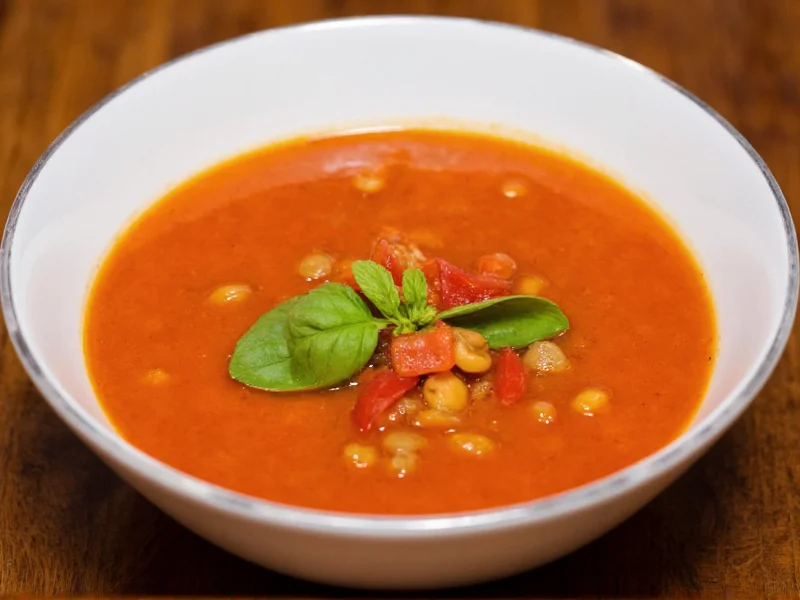The Nutritional Powerhouse in Your Soup Pot
Tomato lentil soup represents one of the most nutritionally balanced comfort foods available to home cooks. Unlike many traditional comfort dishes, this vibrant red soup delivers substantial health benefits without compromising on flavor. The combination of legumes and vegetables creates a complete protein profile while providing sustained energy release through complex carbohydrates and dietary fiber.
Recent dietary studies confirm that regular consumption of legume-based soups like tomato lentil soup correlates with improved cardiovascular health and better blood sugar regulation. The soluble fiber in lentils binds with cholesterol particles, facilitating their elimination from the body, while the lycopene in tomatoes—a powerful antioxidant—increases in bioavailability when cooked.
Essential Ingredients for Perfect Tomato Lentil Soup
Creating an exceptional tomato lentil soup requires attention to ingredient quality and proportions. The following table outlines the precise measurements for a standard six-serving batch:
| Ingredient | Quantity | Preparation Notes |
|---|---|---|
| Brown or green lentils | 1 cup (200g) | Rinse thoroughly, remove debris |
| Canned crushed tomatoes | 28 oz (794g) | Preferably no salt added |
| Vegetable broth | 4 cups (950ml) | Low sodium preferred |
| Yellow onion | 1 medium | Finely diced |
| Garlic cloves | 3 | Minced |
| Olive oil | 2 tbsp | Extra virgin |
| Dried thyme | 1 tsp | Fresh works too |
| Bay leaves | 2 | Remove before serving |
Step-by-Step Preparation Guide
Follow these professional kitchen techniques to achieve restaurant-quality tomato lentil soup at home:
- Sauté aromatics properly: Heat olive oil over medium heat until shimmering but not smoking. Add onions and cook until translucent (about 5 minutes), then incorporate garlic and cook for 30 seconds until fragrant—avoid browning.
- Build flavor foundation: Add tomato paste to the sautéed vegetables and cook for 2 minutes, stirring constantly. This "cooks out" the raw flavor and deepens the tomato essence.
- Add liquids gradually: Pour in 1 cup of broth to deglaze the pot, scraping up any browned bits from the bottom—a crucial step for flavor development.
- Simmer lentils correctly: Add lentils, remaining broth, crushed tomatoes, and seasonings. Bring to a gentle boil, then reduce to a simmer. Cover partially and cook for 25-30 minutes until lentils are tender but not mushy.
- Final seasoning adjustment: Remove bay leaves, then taste and adjust salt, pepper, and acidity. A splash of red wine vinegar (1-2 tsp) often balances the sweetness of tomatoes perfectly.
Popular Variations and Dietary Adaptations
Tomato lentil soup serves as an incredibly versatile base that accommodates numerous dietary preferences and flavor profiles:
- Spicy arrabbiata style: Add 1/2 tsp red pepper flakes with the aromatics and finish with fresh basil
- Creamy version: Blend half the soup, then stir in 1/2 cup coconut milk for dairy-free creaminess
- Mediterranean twist: Add 1/2 cup chopped spinach and 1/4 cup diced olives during the last 5 minutes of cooking
- Protein boost: Stir in 1/2 cup cooked quinoa during the final simmer for additional complete protein
- Smoky depth: Include 1/2 tsp smoked paprika or a small piece of kombu seaweed while simmering
Storage and Reheating Best Practices
Tomato lentil soup actually improves in flavor after 24 hours as the ingredients meld together. Follow these professional storage techniques:
- Cool soup completely before storing—never place hot soup directly in the refrigerator
- Store in airtight containers for up to 5 days in the refrigerator
- Freeze in portion-sized containers for up to 3 months (leave 1-inch headspace for expansion)
- Reheat gently over medium-low heat, adding small amounts of broth if needed to restore consistency
- Never boil reheated soup as this can cause lentils to become mushy
Serving Suggestions for Maximum Enjoyment
Elevate your tomato lentil soup experience with these chef-recommended pairings:
- Top with a dollop of plain Greek yogurt or dairy-free alternative for creamy contrast
- Sprinkle with fresh parsley, cilantro, or a drizzle of high-quality olive oil before serving
- Pair with whole grain bread for dipping or a simple green salad for a complete meal
- Add a squeeze of fresh lemon juice just before eating to brighten the flavors
- For extra texture, include roasted chickpeas or pumpkin seeds as a topping
Frequently Asked Questions
Can I use canned lentils to make tomato lentil soup faster?
Yes, you can substitute 2.5 cups of drained canned lentils for dried lentils, reducing cooking time to 15 minutes. Add them during the final simmer to prevent overcooking and maintain texture.
Why did my tomato lentil soup turn out too acidic?
Excessive acidity typically occurs when using very ripe tomatoes or insufficient balancing ingredients. Add 1/4 teaspoon baking soda to neutralize acidity, or incorporate natural sweeteners like grated carrot during cooking to balance the flavor profile.
How can I thicken tomato lentil soup without adding starch?
Blend approximately one-third of the finished soup until smooth, then stir it back into the pot. Alternatively, simmer uncovered for an additional 10-15 minutes to reduce and concentrate flavors while naturally thickening the broth.
What's the best lentil variety for tomato lentil soup?
Brown or green lentils work best as they hold their shape during cooking while providing earthy flavor that complements tomatoes. Avoid red lentils for this recipe as they become too mushy, though they work well in creamier soup variations.
Can tomato lentil soup be made in an Instant Pot?
Absolutely. Use the sauté function for aromatics, then add all ingredients and pressure cook for 8 minutes with a natural 10-minute release. Total time reduces to 25 minutes while maintaining excellent texture and flavor development.











 浙公网安备
33010002000092号
浙公网安备
33010002000092号 浙B2-20120091-4
浙B2-20120091-4